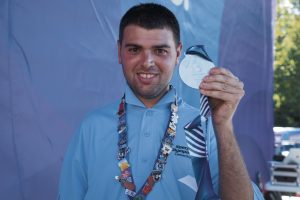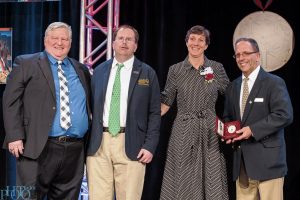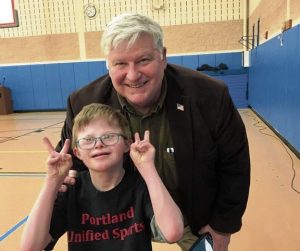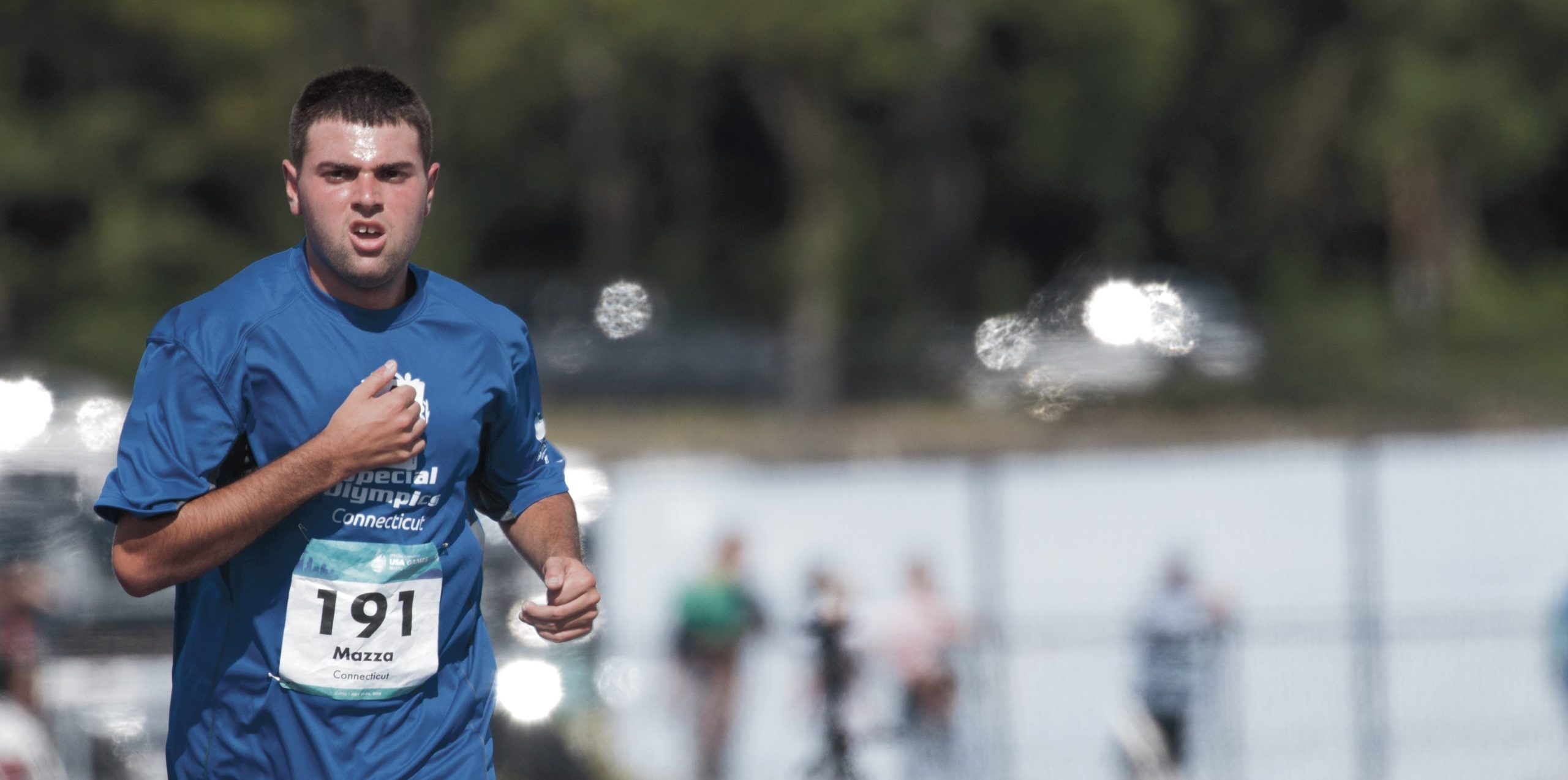If Justin Mazza didn’t have Special Olympics in his life, he figures he’d probably spend a lot of his time playing video games. Instead, he practices and trains and competes nearly every month of the year, has forged strong friendships, and is making memories to last a lifetime.
Mazza began training with Mary-Jane Hussey when he was six years old, when Hussey was his special education teacher at South Elementary School in Windsor Locks, and began competing two years later. Now 26, he competes in track and field, floor hockey, bowling, bocce, and croquet. Although the state Summer Games (held annually each June in New Haven) are the highlight of his year, his shining moment was winning the silver medal in the 4×100 relay at the USA Games in Seattle last year.
“To see where he started, when he couldn’t run 50 meters, to where he is now, is just amazing,” says coach Hussey. “But it’s not just the athletics. It’s also how he’s grown socially and confidently.”
Mazza proudly wore his medal for this interview, during which he and Hussey shared their experiences with Special Olympics Connecticut, now in its 50th year.

The Hamden-based program has grown to include 6,651 athletes and 5,885 partners enrolled in its traditional sports, Unified Sports, and Young Athletes programs. Nearly 14,000 volunteers and 769 certified coaches donate their time and energy to ensure that individuals with intellectual disabilities have opportunities to develop physical fitness, demonstrate courage, and experience the joy of sports.
Special Olympics Connecticut is led by Beau Doherty, who began working with Special Olympics in the early 1980s and became president of Special Olympics Connecticut in 1993. He’s driven by the philosophy of Special Olympics Founder Eunice Kennedy Shriver, a pioneer in the fight for equality for people with intellectual disabilities.
Shriver, angered by the discrimination people with intellectual disabilities faced, spearheaded efforts to create Special Olympics. Following years of her work and advocacy, the first International Special Olympics Summer Games took place on July 20, 1968 at Soldier Field in Chicago. Those first games, which included more than 200 events, resulted from a partnership between the Kennedy Foundation and Chicago Park District. Later that year, governing organization Special Olympics, Inc. was formed, and the games have only grown – in scope and popularity – since.

“I’ve noticed that volunteers get just as much out of it as the athletes,” Doherty says. “Something happens when you do something good for someone else but volunteering with us is a lot more hands-on than doing a walk for charity or raising money. That’s where we’re different.”
Several decades ago, institutions for people with intellectual disabilities began closing, leaving many people without opportunities for exercise and socialization, Doherty says. Special Olympics Connecticut helped fill that void. Now with 74 local programs, it has evolved to offer athletes opportunities in dozens of sports.

Doherty was instrumental in the creation of the Unified Sports program, made up of 2,300 athletes and 3,500 non-disabled partners. In Unified Sports, athletes with and without disabilities train and compete as teammates.
“With Unified Sports, the athletes and non-disabled partners form these incredible bonds,” he says.
Hussey, now in her 37th year of volunteering with Special Olympics, says the program has special meaning.
“When you see the athlete and the partner together, everybody is equal,” she says. “To see how they help each other is just so cool.”
Special Olympics also has expanded over the years to include health and wellness in its mission. The Healthy Athletes initiative began in 1997 after Special Olympics leaders learned from athletes and their families about the lack of quality health care for people with intellectual disabilities from athletes and their family members.
The unique health challenges of those with intellectual disabilities historically were not on the radar for most health organizations, policymakers, universities, and health care associations. Special Olympics began to explore ways to address these disparities, and to date has provided more than 1.4 million free health exams to athletes and trained more than 120,000 health care professionals worldwide.
For athletes like Mazza, Healthy Athletes events are fun, and often include plenty of giveaways. But exams at Healthy Athletes events have also uncovered significant preventable health issues, such as skin conditions, obesity, poor oral health, low bone density, and reduced vision and hearing. As an example, in 2008 the global adult obesity rate was 12 percent compared with 30.9 percent for adults with intellectual disabilities examined by Special Olympics.
Locally, Jean Herzog, PhD., senior director of health and wellness for Special Olympics Connecticut, notes that Special Olympics Connecticut offers seven of the eight Healthy Athletes programs and will offer all eight later this year. Programs offer a wide variety of services, including hearing exams, podiatric screenings, physical therapy, guidance on self-advocacy and making healthy lifestyle choices, free vision assessments, dental examinations, tactics on how to manage stress during competition and daily life, and other physical screenings.
“This is a medically underserved population,” says Herzog. “For many years, people were kind of warehoused. People got ignored. People were on Medicaid or had no health insurance. Special Olympics has made inclusion and equity in health care a focus.”
More than 1,800 health screenings are now done each year in Connecticut, and there have been 2 million screenings internationally. One of Herzog’s goals is to help educate those who provide health care to offer better care for people with intellectual disabilities.
“The standard of care still applies,” she says. “Everyone deserves the same level of care. It’s been very rewarding to watch our health care students who come to volunteer get comfortable and have such a wonderful experience.”
Herzog says Special Olympics now holds the world’s largest data set on the health status of people with intellectual disabilities. Moving forward, Special Olympics is evolving from providing screenings to the larger goals of inclusive and equitable healthcare through partnerships and education, so that not only athletes but everyone with intellectual disabilities can be healthy.
Despite the high number of volunteers who donate their time to Special Olympics Connecticut, Doherty says more volunteers are needed. Coaches and partners are particularly difficult to secure, given the time commitment. But once that bond is formed, these relationships often last for decades.
“When I started coaching, there was nothing here in Windsor Locks for the kids,” says Hussey. “There was no Special Olympics program. So we started our own program. Now we’re in our 23rd year in Windsor Locks, and it’s the 21st year for Justin. It definitely keeps us busy.”
For Mazza, the games present opportunities to keep pushing himself.
“I like to compete in different sports, cheer for my teammates and go to the states,” he says. “I always try my best.”
For more information on a Special Olympics program near you, visit soct.org/get-involved/local-programs.
Upcoming Special Olympics Events
Dream Ride
August 23, 24 and 25
The Farmington Polo Club, Farmington
The Dream Ride Experience is more than an event – it is a movement that makes dreams come true. Dream Ride benefits Special Olympics and The Hometown Foundation, Inc. and provides a weekend packed with fun activities, extraordinary cars, motorcycles and entertainment for guests of all ages. The largest philanthropic endeavor of Bozzuto’s, Inc. and The Hometown Foundation Inc., this three-day event brings thousands of attendees and hundreds of athletes together to participate. The event will take place August 23-25 at The Farmington Polo Club, 152 Town Farm Road in Farmington. To find out more, see a schedule of activities, register your car/motorcycle, and purchase passes online, visit DreamRide.org. Questions? Call 844-DRM-RIDE. Sponsorship and volunteer opportunities are also available.
Over the Edge
September 6
Mohegan Sun, Uncasville
Over the Edge is a fundraiser (to benefit Special Olympics Connecticut) that gives participants the awesome opportunity to rappel more than 30 floors and see amazing sights from atop Mohegan Sun’s Sky Tower!
Participants must pre-register and raise a minimum of $1,000 through online fundraising. No experience is necessary, as training and guidance throughout the descent are provided. Individuals and teams are welcome, and spectators are encouraged to come out and join Special Olympics athletes in cheering on the fearless!
Photos courtesy of Special Olympics Connecticut/contributed







More Stories
Autism Families CONNECTicut Steps Up for the Local Community Building a Nonprofit From the Ground Up
Hospital for Special Care’s Ivan Lendl Adaptive Sports Camp
Special Olympics Connecticut: Supporting and Inspiring a Special Community